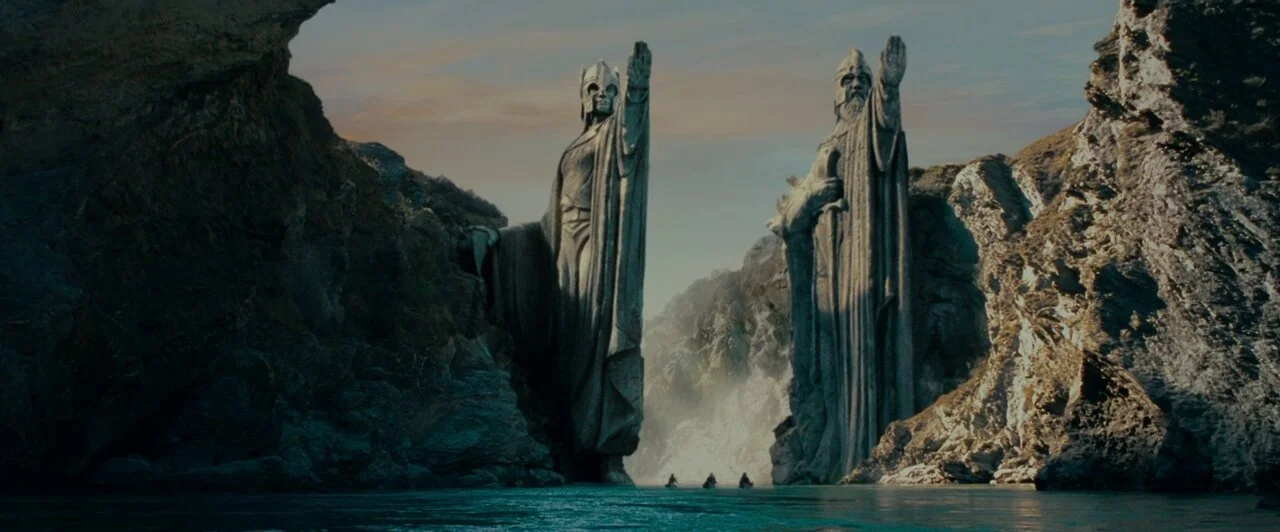Tolkien Tuesday: Making Your Fantasy World Feel Old
If you ever need to make a Tolkien fan despair, I’ve got the perfect weapon for you.
It’s four simple words.
No, it’s not you shall not pass. Pathetic.
The Council of Elrond.
That’s it.
In fact, say that to random people and see who laments. Bam, you got yourself a Tolkien fan.
It’s chapters like “The Council of Elrond” and “Shadows of the Past” that kept readers who loved The Hobbit from reading The Lord of the Rings.
Everything comes to a screeching halt in the narrative, and blocks of history narrative smack you in the face. And for those who criticize it for that–well, it’s a fair assessment. It’s an info dump in a lot of ways.
But there’s more going on, and obviously, a ton of people didn’t mind. The Lord of the Rings is still the fantasy to compare all fantasy to.
So what’s going on here?
Why did Tolkien include so much info, much of it seeming irrelevant or just for those who really want to geek out on it? (like me).
And this isn’t an article telling you that you should have info dump chapters. Uh...no. You won’t get published, and if you self-publish, that’s where you will lose readers for sure.
But there’s a lesson in chapters like “The Council of Elrond” and “Shadows of the Past”…
...your fantasy world needs to feel old.
Building Shadows of the Past in Your Story
Let’s step into the shoes of the most normal average dude in all of Tolkien’s legendarium. The most “us” person in the story–Samwise Gamgee.
Why is Sam important?
He is our window to interacting with Tolkien’s world.
Sam is a normal gardener/informant to a conspiracy group to make sure Frodo doesn’t leave the Shire alone. You know, everyday stuff.
Tolkien skillfully uses Sam to allow us to feel just how deep Middle Earth goes. We feel the weight of the oldness of the world because Sam is just an average guy. He wants to do the right thing, but also just wants a nice beer to end the day with. And damn it if that’s not honest immersion in a fantasy world, I don’t know what is.
Sam is geekin’ out
So yes, “Shadows of the Past” is an info dump, but we need to know the history of the Ring. We need to understand the stakes. And while it’s a lot at once, there are a few things going on.
This chapter sets up the world as older and darker than we think.
We are Sam hiding, listening to this conversation just outside in the garden. We share his shocked curiosity realizing the Ring is more than a neat thing Bilbo found.
Even the Elves feel different.
To Sam they are something mysterious and magical.
To readers they are kinda dicks. They made fun of Bilbo and the Dwarves and are kinda dorky in The Hobbit to be honest.
But here we learn something more.
The wars of old still bear down on the present outside of the Shire. The world is growing more concerned about the loose ends left after the Last Alliance of Men and Elves.
Sure, the Shire is green and full of nosy, but otherwise happy, Hobbits that just want some good drink and pipeweed, but that’s not the case anywhere else.
And it’s beginning to spill into the Shire even now. Strange wanderers moving through the borders of The Shire have this generation of Hobbits concerned.
Sam and Ted Sandyman discuss it at the Green Dragon. (Where their fathers once discussed frivolous rumors about Bilbo, now they discuss concerns of the greater world.)
This gives Middle Earth a history with real meaning. Things have been in motion for a long time, and we are swept up in the middle of it. Sam (and by extension us) are part of a much larger narrative.
It’s kind of like Star Wars. Our first character introductions in the entire series are C-3PO and R2-D2. They have marks and scuffs, C-3PO has a different colored leg–there’s already a history here.
Tolkien just went ahead and told us every detail at once.
Try to work that in little by little in your book. This narrative isn’t the beginning of every story ever told in your world. Things have happened, been happening, and will continue to happen even if our characters don’t get involved.
Maybe it’s a tradition in the kingdom you are creating.
Or a relationship with a foreign power.
Perhaps it’s something as simple as why a particular tavern has the best stout this side of the Magic Sparkling Sea, or whatever.
The point is, your world already had stories. Some of them worth writing books about; that’s just not what this tale is about.
Which leads us to the next point.
The Painful Narrative of the Council of Elrond
Sooo...the “Council of Elrond” chapter.
There’s actually a reason this info dump exists.
And it’s about Elrond.
The time has come to figure out what to do about the Ring.
And boy do they go over some options. One of my favorite–throwing the Ring into the ocean and hoping for the best.
But Elrond has seen the destruction this Ring has caused first hand. Literally.
Sauron wore it against the Free People marching into Mordor.
It’s a little insulting when Boromir says how hopeless it is to fight Mordor when Elrond himself has done it. Walked right into Mordor, and lost many friends. Fought for years inside Mordor if my memory serves me.
OK everyone, we’re gonna let one guy make a really bad choice at the end of all this and we just have to accept it
The world of Elves has changed forever. And no one remembers it...really remembers it...except the Elves. And many of those already left to sail West.
Elrond remains, holding on to that pain. And the very thing they should be rid of sits in front of him in the hands of a Hobbit. Things don’t exactly look up.
This is sort of a post-apocalyptic world to Elrond. His culture is all but gone, and now these short alcoholics are going to succeed where the greatest Elves did not?
Círdan get the boat.
As Sam hears all of these tales while he snoops on the Council, we see it through his eyes again, in a way. These legends of Middle Earth all together talking about things we don’t know about.
And we see pain, old pain, that this fictional world still bears.
Your characters in your story will remember those historical events you set up. Some will be very affected by it. They might even look at your heroes and see well-meaning but stupid, maybe even insulting, people.
And that’s not because they are evil. For Elrond, it’s because the good guys already failed.
Who or what is the Elrond in your story?
Does anyone remember the pain of the old days?
Are there still cultures and people reeling from the mistakes of the past?
This adds depth to your world. These events aren’t just words on paper, they are pain points for a lot of people.
Or worlds they wish they had back.
Lothlorien and the Magic of the Ancient Days
It’s not all pain and shadows in your world. History has joy too.
Lothlorien is the perfect example of this.
The one place in Middle Earth that feels like how things once were is Lothlorien. Adamantly protected, removed from the larger world, it’s a foreign place. Yet familiar.
It is the explanation of why Elrond laments and why the Elves leave. They can never have this again in Middle Earth. Their time has come.
But nostalgic magic remains here. Or at least magic to normal Sam’s eyes.
And that’s the beauty of it. There’s some kind of wisdom lost in the modern world that the ancient days once had. And to Sam, it’s magic. To Galadriel, it’s just how the world works:
'And you?' [Galadriel] said, turning to Sam. 'For this is what your folk would call magic, I believe; though I do not understand clearly what they mean; and they seem also to use the same word of the deceits of the Enemy. But this, if you will, is the magic of Galadriel. Did you not say that you wished to see Elf-magic?'
'I did,' said Sam, trembling a little between fear and curiosity. 'I'll have a peep, Lady, if you're willing.’
Sam represents us so well again. The new adventurer in this world interacting with the ancient.
Is second breakfast considered magic there?
Can you find a way to give a glimpse of the old world in your story?
What was something normal then that is magical now?
Is it something that will guide your characters?
And are the people that honor the old ways right?
There’s wisdom in Lorien for sure. But there’s also something tragic.
They are stuck in a time that has already passed. Sure, the Elves have more than done their share of fighting to protect Middle Earth. But do they leave it all now and forsake all that perished in the past?
It’s interesting that the Elves, especially in Lorien, detest outsiders and condemn the world they once protected.
Nostalgia has become more important than the living.
They sound a lot like Gondor actually. Gondor cares more for what they once were than they are now.
It’s Aragorn that rises above all of this. He values the past but knows things must change for the future, or darkness wins.
Your characters need to interact with the past like this too. There shouldn’t be a clear answer. Just people trying to find things they hold dear in the world you are creating.
The world that is suddenly becoming more and more real to your reader.
Creating an Immersive History in Your Story
All of these “slow” chapters work together.
It’s the history we need to know as a reader—the vital story of the Ring and the power it has.
It’s the struggle against the power of the Ring a long time ago that ultimately failed. The scars that still exist in the world are evidence that this will not be an easy task.
And what the old heroes protected is long gone. It will never return. But the hope is something new and beautiful can be put in its place.
The history of your fictional world needs to influence the story and give it deeper meaning. If characters remember or know of how things once were, your reader can begin to care too.
That creates investment in what the heroes are fighting for. Whether it’s to protect the goodness that is left or remove the evil that has corrupted everything. Or both.
That history doesn’t have to hit us all at once (and shouldn’t) but write knowing your characters have grown up in this world and might not explain everything the first chance they get.
Create a timeline. Put as much as you can on it. Make it what guides you. Guide being a purposeful word choice.
And remember, it won’t all fit in your story. But if you have a sense of depth of the history of your world, that will start to come out naturally as you write.
And even give you some plot ideas.
Perhaps most importantly, have a character that can act as a window for the reader. Let them see the world as the reader does. New and fresh, yet old and mysterious.
Your world is lived-in.
Make it so your reader feels they can almost live there too.
If you like all this geeky crap that also helps you write, sign up for my newsletter. We will geek out over our favorite movies, shows, books, and games to see what storytelling techniques can help us be better writers. Check it out:










